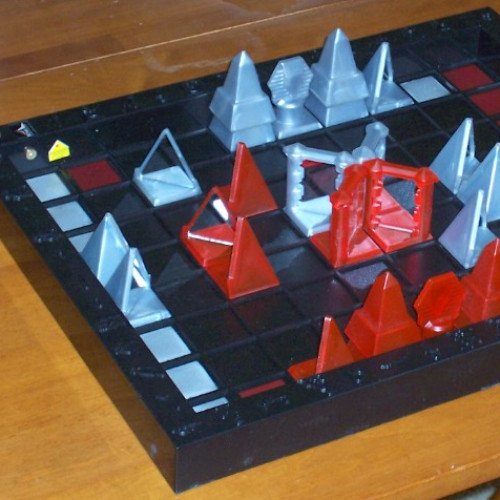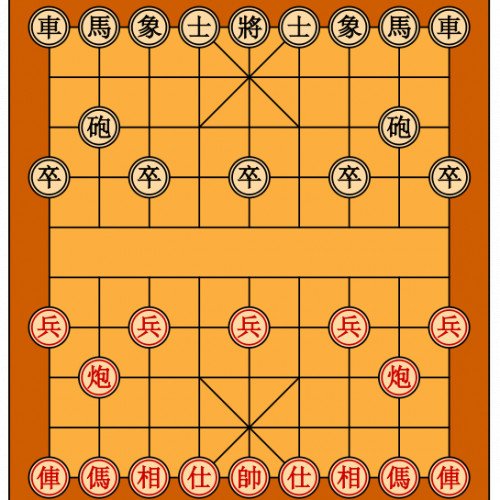KHET VS XIANGQI

KHET
Khet is a chess-like abstract strategy board game using lasers that was formerly known as Deflexion. Players take turns moving Egyptian-themed pieces around the playing field, firing their low-powered laser diode after each move. Most of the pieces are mirrored on one or more sides, allowing the players to alter the path of the laser through the playing field. When a piece is struck by a laser on a non-mirrored side, it is eliminated from the game. Under its original name, the game was a Mensa Select Award winner. Its name was changed on September 15, 2006. The new game retains the same rules of gameplay, but has a different design, including a new color scheme and a new box design. Under the new name, the game was one of five finalists for the 2007 Toy of the Year award. Professor Michael Larson and two students, Del Segura and Luke Hooper, designed the game as a class project at Tulane University. (Professor Larson is now at the University of Colorado.) The game was introduced to the public in the spring of 2005, and was first brought to prominence at the New York Toy Fair of that year. The game was first shipped in October 2005. The first Deflexion World Championship was held December 10, 2005 under the dome at the Massachusetts Institute of Technology. Registration was free, and the participants competed for cash and other prizes. The winner was an MIT student. Under the new name, Khet, the first Regional Championship took place in April 2006 at the famous Café du Monde in the New Orleans French Quarter. Twenty-four participants competed for a number of prizes. As a special bonus, the Eye of Horus beam splitter was unveiled at the very end, and used by each player in the championship game. Khet was also featured on a recent episode of the HGTV show "I Want That: Tech Toys". Footage from the New Orleans tournament was included in the broadcast. In 2017 a company called "Thinkfun" acquired the license for the now out of print Khet 2.0 and rebranded the game "Laser Chess". Now with a new, modernized scifi look, it brings the exact same rules and feel of Khet 2.0 back to the table.
Statistics for this Xoptio

XIANGQI
Xiangqi (Chinese: 象棋; pinyin: xiàngqí; Wade–Giles: Hsiang ch'i; English: /ˈʃɑːŋtʃi/), also called Chinese chess or Elephant chess, is a strategy board game for two players. It is one of the most popular board games in China, and is in the same family as Western chess, chaturanga, shogi, Indian chess and janggi. Besides China and areas with significant ethnic Chinese communities, xiangqi is also a popular pastime in Vietnam, where it is known as cờ tướng. The game represents a battle between two armies, with the object of capturing the enemy's general (king). Distinctive features of xiangqi include the cannon (pao), which must jump to capture; a rule prohibiting the generals from facing each other directly; areas on the board called the river and palace, which restrict the movement of some pieces (but enhance that of others); and placement of the pieces on the intersections of the board lines, rather than within the squares. Xiangqi is played on a board nine lines wide and ten lines long. As in the game Go (圍碁; or Wei ch'i 圍棋), the pieces are placed on the intersections, which are known as points. The vertical lines are known as files (Chinese: 路; pinyin: lù; "road"), and the horizontal lines are known as ranks (Chinese: 線/綫; pinyin: xiàn; "line"). Centred at the first to third and eighth to tenth ranks of the board are two zones, each three points by three points, demarcated by two diagonal lines connecting opposite corners and intersecting at the centre point. Each of these areas is known as 宮 About this soundgōng, a castle. Dividing the two opposing sides, between the fifth and sixth ranks, is 河 hé, the "river". The river is often marked with the phrases 楚河 About this soundchǔ hé, meaning "River of the Chu ", and 漢界 About this soundhàn jiè, meaning "Border of the Han", a reference to the Chu–Han War. Although the river (or Hanchu boundary) provides a visual division between the two sides, only two pieces are affected by its presence: soldiers have an enhanced move after crossing the river, and elephants cannot cross it. The starting points of the soldiers and cannons are usually, but not always, marked with small crosses.